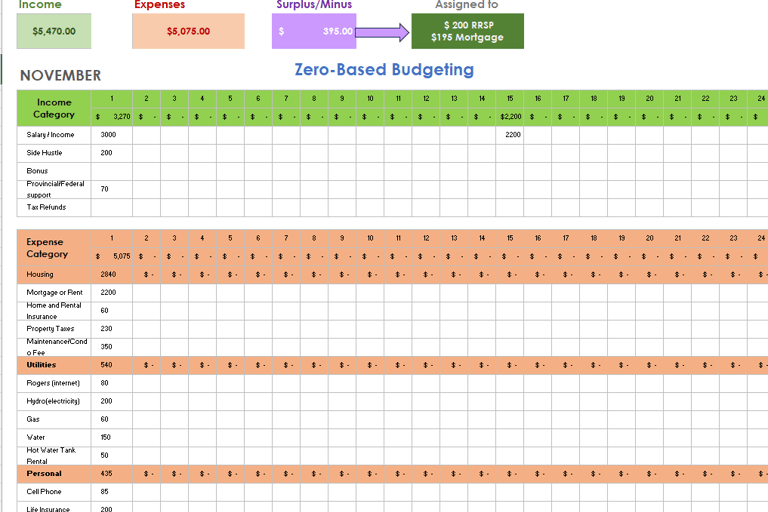10 Practical Money Saving Advice for Everyday People
Discover practical and realistic money saving advice designed for everyday people. Learn how to save money effectively, apply zero based budgeting, and follow smart tips that truly work to enhance your financial well-being.


Have you ever felt like you do everything right but still can’t seem to save enough? You cut your spending, skip treats, and follow every “rule,” but your bank balance never moves the way you hope?
I’ve been there — and I used to believe saving money was all about cutting back. But the truth is, the best money saving advice isn’t about restriction. It’s about clarity, structure, and knowing what truly matters.
You don’t need to be perfect or earn a fortune to build savings. You just need the right habits, the right mindset, and a plan that works for your life.
Here are ten pieces of money saving advice I wish I had learned sooner. They’re simple and built for real life!
1. Start Small, But Start Now
Waiting until you “have more” money is one of the biggest traps. The habit of saving is built through action, not the amount.
Even setting aside $10 each week builds consistency. That small effort teaches you discipline — the same discipline that will help you manage larger amounts later.
The best money saving advice is to start with what you have. The size of your start doesn’t matter; the act of starting does.
2. Pay Yourself First — Automatically
If you wait until the end of the month to save, there won’t be anything left. That’s why one of the smartest money saving tips is to treat saving as a non-negotiable bill.
Set up an automatic transfer to your savings account the moment your paycheck arrives. When saving becomes automatic, it no longer depends on willpower.
Automation is quiet discipline — it builds wealth while you live your life.
3. Know Your Real Priorities
Most people think saving fails because they don’t make enough. Often, it fails because they don’t know what matters most.
List your top three priorities — maybe it’s family security, paying off debt, or future travel. Once you know what truly matters, it’s easier to cut out what doesn’t.
This is practical money saving advice: don’t just reduce spending — redirect it toward your real goals.
4. Learn the Power of Zero Based Budgeting
Traditional budgets often leave “extra” money unplanned, and that’s where it disappears. With zero based budgeting, you assign every dollar a purpose — bills, groceries, fun, savings — until your income minus expenses equals zero. I will talk more on this and this is one of my fave in managing our dough
This method helps you see clearly where your money goes. It’s not about restriction; it’s about control. If you’re learning how to save money in Canada, zero based budgeting works especially well for handling high living costs.
5. Build a Backup Savings
Unplanned things can happen at any time. A flat tire, a sudden bill, or a small home repair can quickly cause stress if you do not have a backup. Having a peace fund gives you breathing room so those surprises do not turn into new debt.
Start with a small amount you can manage, such as $300 or $500 in total. This is not something you save every month, but a first safety layer to protect yourself from small emergencies. Once you reach that goal, you can slowly grow it toward one month of essential expenses.
A peace fund is not just about money. It is about calm. It reminds you that you are prepared and that you can handle whatever life brings next
6. Spend Where It Adds Value
Saving does not mean saying no to everything. It means saying yes to what truly adds value.
Choose to spend on things that improve your daily life. Tools that save time, healthy food that keeps you strong, or classes that help you grow. Skip the things that only give short bursts of satisfaction.
This is smart money saving advice. Spend intentionally and let your choices reflect what really matters to you. Value will always be greater than volume.
7. Find Small Leaks and Fix Them First
You don’t need to make drastic changes to save more — just stop the little leaks.
Check for unused subscriptions, old plans, or fees that sneak out monthly. Canadians especially can save hundreds each year by comparing phone or internet providers — one of the easiest ways to save money Canada families overlook.
Every small leak you fix gives your savings more room to grow.
8. Track Your Emotions, Not Just Expenses
Budgets often fail because they ignore emotion. Sometimes we spend not from need, but from stress, boredom, or reward.
Keep a simple note of how you feel when you make unnecessary purchases. You’ll start noticing patterns — and that awareness is the first step toward change.
This kind of emotional honesty is underrated money saving advice that truly works long-term.
9. Review and Adjust Every Month
No plan works forever. Your needs change — and your budget should, too.
At the end of each month, take 15 minutes to check your progress. Did your savings grow? Did any category go over budget? Adjust next month’s plan accordingly.
This is how money saving tips turn into lifelong habits — through regular reflection and improvement.
10. Reward Progress, Not Perfection
Saving isn’t about punishment; it’s about progress. Don’t beat yourself up if you overspend one week — what matters is that you keep moving forward.
Give yourself small, meaningful rewards when you hit milestones: maybe a coffee date, a short trip, or something you’ve wanted for a while.
Because the truth is, the most sustainable money saving advice is joy. When saving feels rewarding, you’ll never want to stop.
Final Thoughts
Good saving habits are built one clear decision at a time. You don’t need a miracle — you need awareness, structure, and consistency. Follow this money saving advice to simplify your finances and build peace of mind.
Whether you’re learning how to save money in Canada or just starting fresh, remember: you don’t have to be perfect. You just have to begin — and keep going.








